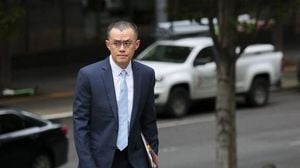Vanuatu, still reeling from the impact of a devastating earthquake, recently held a contentious snap election, sparking significant frustration among its citizens. The 7.3 magnitude earthquake struck on December 17, just weeks before the election, leaving many from the capital, Port Vila, displaced and struggling for stability.
Gloria Julia King made history as the first elected female politician in Vanuatu for 14 years, offering some hope for female representation amid troubling times. Yet, her election coincides with broader concerns about the government’s prioritization of political maneuverings over pressing humanitarian needs.
The election, conducted on January 16, was announced just two months prior, leading to claims of political opportunism. Voter participation was alarmingly low, with reports indicating less than half of the electorate turned out to cast their votes. Many residents were likely disenchanted or simply overwhelmed, as they faced the harsh realities of life post-earthquake.
Moses Willie, reported by ABC News, captured the sentiments of voters as he stated, "The mood in Vanuatu is one of frustration, the community believes the government put politics before people." With many families uprooted from their homes and facing job losses, the urgency of the situation left residents reluctant to engage with the electoral process.
The aftermath of the quake left the Central Business District (CBD) of Port Vila under lockdown, with many businesses forced to shutter, deepening the crisis of unemployment. The continuing aftershocks added to the public's anxiety, leaving them questioning the effectiveness of their government during such emergencies.
While unofficial tallies suggested former deputy prime minister Jotham Napat, head of the Leaders Party, would triumph with support from at least eleven members of parliament, the election results have not been without complications. Early indicators showed many incumbents retaining their positions, with only two new members elected from Port Vila. The loss of the incumbent female MP means the representation of women remains critically underwhelming, as only one female candidate, Marie Louis Milne, competes for the remaining seat.
This snap election came under intense scrutiny, with allegations surfacing about the government's failure to address citizens' immediate needs. Vanuatu's residents were still recovering from the earthquake’s devastation, leading many to voice their discontent over the timing of the elections. Reports of ballot boxes arriving late and the counting process likely pushing past the weekend only compounded the frustrations voiced by both the electorate and those involved in the governance of Vanuatu.
The demographic of the electorate faced enormous challenges, not only from natural disasters but also from the political climate characterized by distrust and dissatisfaction. Willie noted how the assembly of voters had been reduced to mere numbers, saying, "We are still experiencing daily after-shocks. The CBD is in lockdown, there's a lot of unemployment and some businesses have been forced to close down.”
The elections, held amid these circumstances, raised questions over the integrity and motives of the government, which many believe prioritized maintaining political power over aiding the affected populace. The ramifications of this election extend far beyond the immediate political outcomes, fundamentally challenging the social fabric of Vanuatu.
The looming demolition of key structures damaged during the earthquake adds another layer to the political and social turbulence. Vanuatu’s response to its natural disaster encapsulates the broader struggles of addressing immediate humanitarian concerns versus the imperative to uphold political stability.
The snap election results are set to shape the future of Vanuatu as it navigates the dual crises of reconstruction and governance. The apparent preferences of leaders, such as Jotham Napat, to form coalitions reflect the precariousness of political landscapes post-disaster, accentuated by public sentiment demanding accountability and transparency.
Reflecting on the election’s significance, Gloria Julia King’s position presents a symbolic opportunity for change amid the chaos. Whether her presence among the ranks of Vanuatu's leaders can translate to tangible improvements for the people remains to be seen. With the community's trust hanging by a thread, the government faces the relentless challenge of fulfilling its obligations to the citizenry just as they begin to reclaim their lives from the devastation.
Overall, Vanuatu's snap election serves as both a reaction to the recent earthquake and as a stage for political dialogue. The people demand more than just political rhetoric; they seek substantive action and commitment from their leadership to rebuild their lives and restore hope for the future.



